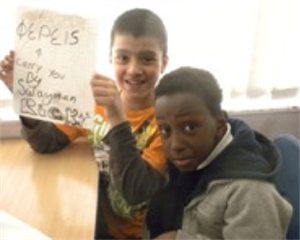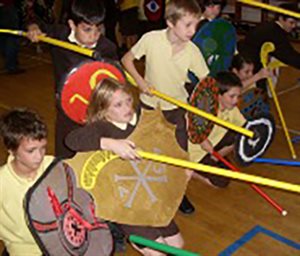King's Ancient Languages Summer School
Each summer we offer two Intensive Courses in Ancient Greek and Latin. These courses are six weeks long, with the option to study either the first three week block (for absolute beginners) or the second three week block (for students at intermediate level).
These courses offer students who have not previously had the opportunity to study Ancient Greek or Latin intensive training designed to bring them from complete beginners to a point where they are able to read simple texts in Greek or Latin. They are ideal for students who intend to study for a Masters or Doctoral degree to get ahead during the summer, thus acquiring an essential skill for their future research. They are also appropriate for teachers, undergraduates, mature students and anyone with an interest in the Hellenic or Roman world.
Find the most up to date details and how to apply on this webpage or contact asksummer@kcl.ac.uk.
London Summer School in Classics
Students also have the opportunity to apply for the London Summer School in Classics.
Find the most up to date details and how to apply on this webpage.
ACE, Supporting Classical Civilisation and Ancient History A-Level
The Advocating Classics Education (ACE) project widens access to the study of the Classical world in British secondary schools. Led by Professor Edith Hall and Dr Arlene Holmes-Henderson, the project brings together 16 university partners around the UK to support the introduction of qualifications in Classical Civilisation and Ancient History for students aged 14-18. Thanks to the national charity Classics for All, teacher training can be provided free of charge to schools.
Postgraduate students have been involved from the outset: providing support with the website, social media, impact measurement and representing the King's Classics Department at public-facing events in partner schools, sixth-form colleges and universities. The opportunity for university students to meet school/college students and share their experiences of Higher Education provides a forum in which knowledge can be exchanged in an informal and accessible way.
Visit Ace Classics Education for video interviews with school students and teachers.
Twitter: @classcivanchist
Facebook: Advocating Classics Education
Educational projects in and around London and its museums
Dr Ellen Adams is setting up a brand-new network of staff in London’s museums, which will support her work investigating how British Sign Language (for the deaf) and audio description (for blind and partially sighted people) offer new ways of seeing visual culture. For more information please visit the MANSIL (Museum Access Network for Sensory Impairments (London)) website.
Professor Hugh Bowden can be heard explaining the mysteries of Mithras in the interpretation area of the London Mithraeum. As an expert on ancient mystery cults, he was a historical consultant on the project to redisplay the temple of Mithras at the Bloomberg building in the City of London.
Dr Daniel Orrells regularly teaches adult education classes on the antiquities collection at the Freud Museum in North London. These classes explore the importance of antiquity for the development of modern psychology and anthropology.
Watch Dr Daniel Orrells's video tours through the Freud Museum London:
Iris Project
The Classics Department works with the Iris Project to deliver the Inner London Latin Project, part of their Literacy Through Latin initiative. Every year, 5-10 student teachers are paired with a state primary schools in the capital with low literacy levels or a high percentage of children on free school meals.
Student teachers introduce pupils from Years 5 and 6 to the Latin language, making learning fun, relevant and accessible by using activities and games. They also offer a taste of classical culture via storytelling and drama. Teaching in local schools is a rewarding and enriching experience, and can make a profound difference to the lives of young children growing up in deprived urban areas. It gives students the chance to engage with local communities and to gain valuable training from King’s School of Education, Communication & Society and practical experience of teaching.
If you are interested in taking part, please contact Dr Will Wootton, Project Co-Ordinator, King's Classics Department or Lorna Robinson, Director of the Iris Project.

